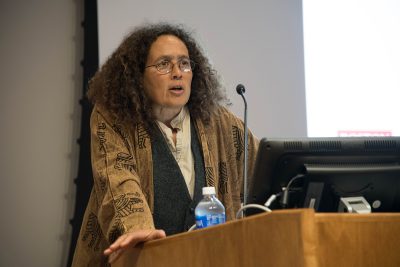
Approximately 70 students and professors gathered Thursday night in the Boston University Law Auditorium, where professors engaged in discussion with the BU community and the public on this year’s Gerald and Deanne Gitner Family College of Arts and Sciences Lecture topic – “Trump vs. Clinton: How Does 2016 Compare?”
The Gitner Lecture series was created three years ago to offer the broader community an opportunity to consider important public questions. They are conducted in honor of university alum Gerald Gitner, CAS Dean Ann Cudd said.
Bruce Schulman, a history professor, said in an interview prior to the event that the lecture is significance because “the idea is to share the fruits of the kind of research we do, and to share the kind of thinking that we do in our research and in our teaching.”
As the historian of the panel, Schulman spoke first and analyzed the uniqueness of the 2016 election, along with the historical occurrences by which the candidacies of Donald Trump and Hillary Clinton were made possible.
“Yet startling as they may seem, neither Donald Trump nor Hillary Clinton’s presidency came out of nowhere,” Schulman said during the lecture. “The playing out of the opening of the presidential selection process began nearly 50 years ago.
Schulman said that because of the increase of primaries in the United States during the nomination of a candidate, Trump was enabled to become the Republican nominee despite opposition from party leaders. Schulman compared Trump’s antics and strategies to those of Richard Nixon and his media advisor Roger Ailes, who embraced entertainment and recognized its benefits within the election.
Katherine Levine Einstein, a political science professor and another speaker, said there are two distinctive aspects of the 2016 election that threaten the democratic process — misinformation and the violation of deeply democratic norms.
“Misinformation,” Einstein said, “is associated with group identities like partisanship.”
As a result of misinformation, the 2016 campaign strategies were altered to spend much more time turning out their own respective bases, as opposed to trying to persuade stubborn outsiders, Einstein said.
On the other hand, the violation of democratic norms, such as Trump’s refusal to declare whether he will accept a Clinton victory, threatens the democratic process of peaceful transition, she added.
As the final panelist, Neta Crawford, a political science professor, said democracy itself is having a legitimation crisis.
The remedies, Crawford said, are competent citizens engaged in rational discourse, civil societies like voluntary associations, public spheres for political discussion and education and transparent government organizations that support the development of competent citizens.
“Democracy is a process,” Crawford said. “Democracy is the free and reasoned agreement of individuals who are promoted to the common good. It is much more than elections.”
Following the speakers’ lectures, the audience presented questions for the panelists, covering topics such as the importance of objectiveness in the media, war, polarization and the need for an educated population.
Vicki Saeed, a CAS junior, said after the lecture that the experience was informative and supplied a fresh perspective on the election.
“It was a great panel,” Saeed said. “I enjoyed the information on misinformation. Also, it wasn’t all doom and gloom. I liked to hear about what is causing this calamity that we found ourselves in.”























































































































